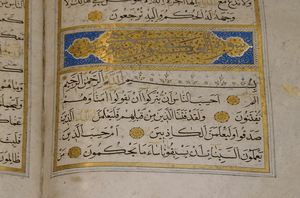Today, man thinks he has no need of Allah. Technological advancements and material abundance make many believe that their accomplishments are due to their own efforts. Failing to recognise the Source of all blessings leads to ingratitude and arrogance. It is this arrogance which leads to rejecting Allah, which can be seen in the rise of atheism and secularism in the world. Instead of calling to the worship of the One True God, society glorifies and calls to the worship of the ‘self.’ Individual liberty and the pursuit of pleasure have become the new religion.
Man’s arrogance makes him think that he is strong, independent and can do as he freely wishes. It leads him to trampling over the rights of Allah’s creation and causing chaos on the earth. Allah (ʿazza wa jall) says, “But man crosses the limits, because he deems himself to be free of need” (96:67).
We often forget that as humans, we are intrinsically weak. We were created from dirt. We started off from a drop of dirty “worthless fluid” (77:20) which is not even pleasant to smell. With such humble origins, we should never feel proud or act arrogantly. We cannot even be certain of what will happen tomorrow. No matter how rich and powerful we may become in this world, a day will come – very soon – in which our bodies will start giving in on us; our mental faculties will begin to deteriorate; and soon we will be dead.
Without Allah, we are nothing. We need Him for everything. We need Him to feed us. We need Him to grant us health, money, spouses, children, family and friends. And most importantly, we need Him to guide us, to love us, and to protect us.
ʿUbudiyyah: The Purpose of Life
Allah (subḥānahū wa taʿālā) did not leave us to wander aimlessly in this life, or live a life full of angst and confusion, never finding peace and contentment. He (subḥānahū wa taʿālā) told us exactly why He created us and what our purpose in life is. He (subḥānahū wa taʿālā) says, “I did not create jinn and men except so that they worship Me” (51:56).
ʿIbādah (worship) and ʿubūdiyyah (servitude) are the believer’s life goals. When we say lā ilāha illā-Allāh, we are saying that Allah Alone is worthy of our worship. This is our life mission statement.
ʿUbūdiyyah is a state of the heart, which manifests itself in external acts of worship. The goal of all physical acts of worship is to attain the state of ʿubūdiyyah. ʿUbūdiyyah is to fully humble oneself to Allah, submit to Him and love Him more than anyone else.
“The intended outcome of all acts of worship is to magnify, venerate and be in awe of God.” – al-ʿIzz b. ʿAbd al-Salām (raḥimahullāh)
ʿUbūdiyyah is to fully surrender yourself to Him and to express your dire need of Him. It is to free yourself from the dictates of your desires and nafs, and devote yourself to Allah. It is to realise that He is your Rabb –The Nurturing Lord – and you are His ʿabd – His humble, weak slave, who is always in need of Him and cannot do anything without Him.
ʿUbūdiyyah is attained through maʿrifah: through gaining a deep awareness of who Allah is and how Majestic and Perfect He is; and then contrasting this with your sins and endless shortcomings. Even the good you do is full of deficiencies. ʿUbūdiyyah is to see yourself as completely helpless and impoverished: every atom in your body is completely dependent on Him. You feel that were He to leave you to fend for yourself for even the blink of an eye, you would perish. Thus, you constantly seek His help for everything. You rely on Him and turn to Him for all your needs, whether big or small. This is the essence of لَا حَوْلَ وَلَا قُوَّةَ إِلَّا بِالله: a treasure from the treasures of Paradise.
A key component of ʿubūdiyyah is love. When a servant thinks of how much Allah blesses and endows him, his heart can only be overwhelmed with love for Him (see article loving Allah). Reflecting on the generosity, kindness and love of Allah; and then contrasting this with our sins and meagre offerings of worship, should fill our hearts with shame and make us lower our heads in humility to Him. Constant reflection on this should lead to a state of heart in which the servant is always seeking the pleasure and love of his Master (subḥānahū wa taʿālā).
ʿUbūdiyyah is a constant state: a permanent lifestyle. It is not limited to performing the five daily prayers, occasional dhikr or duʿā’ or giving charity. It is a state which permeates every aspect of your life: everything you do is for Him. Even your everyday mundane actions such as eating and drinking become an act of worship through your intention.
ʿUbūdiyyah is to humble yourself and submit yourself to the commandments and prohibitions of Allah. It is to give preference to His commands, whether they appear rational to us or not. If we are unable to rationalise something of Allah’s words or the words of His Prophet ﷺ, then we should consider our intellect to be deficient, not the words of Allah and His beloved.
“Whoever seeks eternal happiness should stand firmly at the doorstep of ʿubūdiyyah (servitude).” – Ibn Taymiyyah (raḥimahullāh)
ʿUbudiyyah: The Greatest Honour
ʿUbūdiyyah is the loftiest and most honourable status any human being can attain. Allah repeatedly praises His Prophets – the best of men – with the epithet ʿabd (servant). He says, “Glory be to the One who made His servant (i.e. Muḥammad ﷺ ) travel by night from al-Masjid al-Ḥarām to al-Masjid al-Aqṣā…” (17:1). Similarly, about Sulaymān and Ayyūb (ʿalayhimas-salām), Allah said “What an excellent servant he was!” Allāhu Akbar! Imagine Allah (subḥānahū wa taʿālā) describing you as an excellent servant. Can there be a greater honour than this?
“It is enough of an honour for you that you are His servant, and it is sufficient glory for you that He is your Lord!” – Ibn al-Qayyim (raḥimahullāh)
ʿUbudiyyah Liberates You
Islam came to liberate humans from the worship of other human beings, desires, animals, and celestial bodies. Islam came to liberate man from worshipping the creation of Allah to worshipping the Creator of all creation. This is the peak of freedom.
Every human worships someone or something. Some people worship money, others worship power. Others worship fame, pleasure, beauty, knowledge, people, nature and even animals! All these objects of worship are delusions that leave its adherents unfulfilled. One can only be truly free, happy, and at peace, if he chooses to submit to and worship Allah (ʿazza wa jall). Ibn Taymiyyah (raḥimahullāh) writes, “The happiest of all creation are those who have the highest levels of servitude to Allah.” This is because the more the servant humbles himself to Allah, the closer he is to Him, and thus he receives a greater share of His special care and love.
The more you enslave yourself to Allah, the freer you will be. The more you attach yourself to Allah, the less you will depend on His creation.
The words ‘servitude’, ‘slave’, and ‘servant’ may carry negative connotations, due to their historical associations. Servitude to Allah, however, is nothing like servitude to other human beings. Servitude to Allah brings with it deep contentment, joy and comfort. Also, Allah does not benefit from the servitude of man, but rather the servant himself benefits and is honoured by it.
All human beings are servants of Allah – whether they acknowledge it or not. This is because Allah is the Ultimate Master; the only One who has complete authority and ownership over the universe. Whilst we can choose many things, many other things are out of our control.
Whilst some of His servants are His servants by lack of choice, those who believe in Allah are His servants by choice. They recognise Him, worship Him and choose to submit to Him. They are His true ʿibād (servants). Imām al-Shāṭibī (raḥimahullāh) writes, “The objective of the sharīʿah is to free the human from the grip of his own whims and desires, so that he becomes a (obedient) servant of Allah by choice, just as he is a servant of Allah by no choice of his.”
Fasting and ʿUbudiyyah
Fasting is an expression of our ʿubūdiyyah to Allah (subḥānahū wa taʿālā). Fasting frees the human being from being enslaved to his desires, habits and physical needs. By fasting, we obey Allah’s command and submit ourselves to Him. By fasting, you say to your nafs: even though you may desire something, my obedience and loyalty is reserved for someone far greater: Allah, my Lord, my Creator!
Fasting reveals to us how weak we are. Just a few hours without food and drink makes us cranky and, sometimes, physically weak. Thus, if done properly, fasting will purify us from arrogance.
Speed Up in Your Journey to Allah this Ramadan
There is a secret which enables a person to race ahead in his journey to Allah. It is ʿubūdiyyah. ʿUbūdiyyah is to infuse all the outer physical acts of worship with full humility, submission, love, fear and hope. Even if the quantity of your actions is small, the quality of your actions will allow you to reach far ahead of your peers.
Humbling oneself and showing your servitude is the quickest route to Allah. One of the pious predecessors said, “I have tried coming closer to Allah by entering all the doors of worship. But every time I came close to a door, I found that it was crowded with people; thus, I was unable to enter until I approached the door of humility and desperate need for Him. I found that it was in fact the nearest and widest of all doors to Allah; there were not any crowds at it nor were there any barriers. As soon as I placed my foot inside, He took my hand and admitted me inside.”
Make this Ramaḍān special by infusing all your physical acts of worship with the quality of ʿūbūdiyyah. When you fast, fast like an obedient servant, one who does not complain of hunger, but is so eager to please his Master. Fast with humility, with your heart devoted to Him, with full hope in Him Alone.
When you pray, pray like a servant. Pray with khushūʿ, with full humility and focus. Feel like a humble beggar in the courtyard of the Most Magnificent. As you stand, lower your gaze and be in awe of the majesty of The One you are addressing. Express your lowliness by rubbing your face – the most noble part of your body – on the ground.
When you make duʿā’, make the duʿā’ of a servant. Affirm your helplessness and desperate need for Him. Turn to Him as a humble beggar and cry to Him. Feel that not a single hair in your body can do without Him. This Ramaḍān, train yourself to ask Allah for all your needs throughout the whole day. By reciting the sunnah adhkār and duʿās, feel your need for Him, even if it appears to be something mundane (e.g. going to the bathroom, leaving the house).
We ask Allah, The Lord of the heavens and the earth, to make us from His special servants who love Him, humble themselves to Him and submit to Him.






